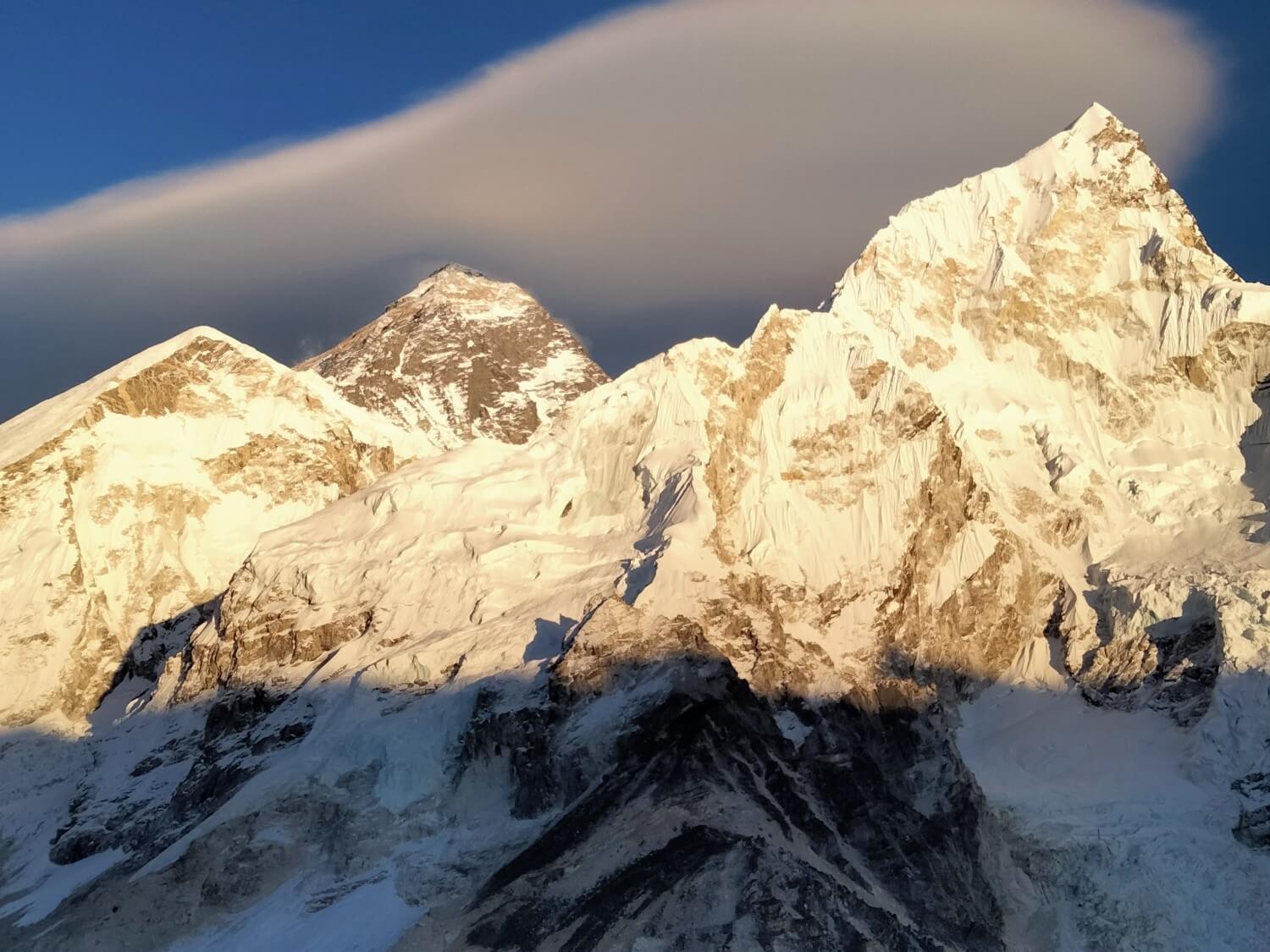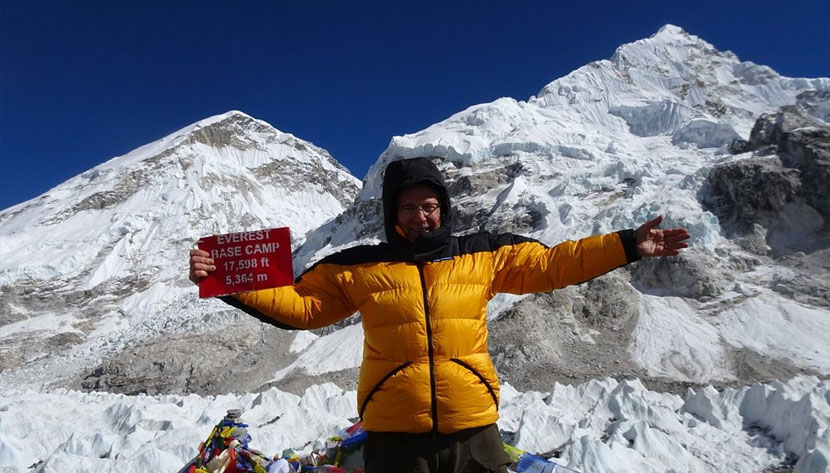Main Navigation

It is very difficult question to answer, what fitness level is required for Everest Base Camp Trek in Nepal. Personally, being a frequent travelers to Himalaya and Everest region, I believe that any fitness level is okay to accomplish Everest Base Camp Trek. What it only demands is a great passion to go there. During my course of travelling, I have encountered many elderly people of 60s and 70s trekking Everest Base Camp in a comfort way. Likewise, I have also seen many fit and young people crawling there but overweight people completing the trek successfully.  Everest Base Camp Trek do not require you to be an athletic but a basic fitness level is indeed important. Some part of the EBC trail is very strenuous, so you need to take your time and walk slow. Trail from Monjo to Namche Bazaar is really strenuous where you need to use your walking technique. Similarly, trail route between Pugi thanga to Tengboche tests your fitness level and endurance capacity. After that, if you are travelling Old Ama Dablam Base Camp during rest day at Dingboche, I would say, this would be another strenuous hiking equivalent to Kalapatthar. I recommend you to go there, as you can have the best view of Mount Makalu and Cho-Oyu. In between, Lobuche to Gorak Shep, you need to hike through small passes which is less strenuous. Then, trekking to Kalapatthar is the toughest hike of your entire EBC trek, but if you walk slowly at your own pace, I guarantee it would be the most delightful journey of your lifetime. So, the answer to question of what kind of fitness level is required for Everest Base Camp Trek, I would say moderate level fitness. If you are an athlete, regular gym guy or a runner, you are completely fit for trekking in Everest. As I said above, I saw many young and fit people crawling during EBC trek. They actually get exhausted because they lose their determination and lost interest in trekking. One you lose your determination and start thinking why I pushing myself to this extent for nothing or what is the use of such strenuous work, you will gradually start getting exhausted and probably need rescue. So, remember- the determination and passion comes first to the fitness. However, fitness level can be taken lightly.
Everest Base Camp Trek do not require you to be an athletic but a basic fitness level is indeed important. Some part of the EBC trail is very strenuous, so you need to take your time and walk slow. Trail from Monjo to Namche Bazaar is really strenuous where you need to use your walking technique. Similarly, trail route between Pugi thanga to Tengboche tests your fitness level and endurance capacity. After that, if you are travelling Old Ama Dablam Base Camp during rest day at Dingboche, I would say, this would be another strenuous hiking equivalent to Kalapatthar. I recommend you to go there, as you can have the best view of Mount Makalu and Cho-Oyu. In between, Lobuche to Gorak Shep, you need to hike through small passes which is less strenuous. Then, trekking to Kalapatthar is the toughest hike of your entire EBC trek, but if you walk slowly at your own pace, I guarantee it would be the most delightful journey of your lifetime. So, the answer to question of what kind of fitness level is required for Everest Base Camp Trek, I would say moderate level fitness. If you are an athlete, regular gym guy or a runner, you are completely fit for trekking in Everest. As I said above, I saw many young and fit people crawling during EBC trek. They actually get exhausted because they lose their determination and lost interest in trekking. One you lose your determination and start thinking why I pushing myself to this extent for nothing or what is the use of such strenuous work, you will gradually start getting exhausted and probably need rescue. So, remember- the determination and passion comes first to the fitness. However, fitness level can be taken lightly.
If you are an experienced trekkers, EBC trail would not bother you but I consider it to be moderately difficult trek in Nepal and I personally recommend you to train well prior the journey. This increases you stamina, confidence, endurance capacity and allows you to enjoy as much as you can. 
I have listed my key exercises below which I did at least 2 months before kicking off my journey to Everest Base Camp. I strongly suggest you to train for Everest Base Camp with these lifts. They are part my current and on-going training routine. However, training your legs is the best way to improve your trekking performance.
My work-out route lasts for more than 45-60 minutes per day. Further, I add some additional time (up to 30 minutes) for cardiovascular training to gain more strength and stamina.
Running, rowing, cycling, swimming and hiking at mountain terrain carrying a light rucksack is the great way of building your endurance. Mix it up and train yourself again and again. Carry your day pack and walk uphill for several hours, this lets your shoulders adjust the weight and feel carrying the additional weight.
Don’t ignore proper nutrition. You need to take balanced died to be strong and maintain a good level of fitness. As you start working out and train harder, more strain will be placed on your body and carbohydrate stores. So it is wise to supply your body enough fuels it needs before and after the exercise.
 Everest region, averaging 4,000m (12,800ft) with Kalapathar (5,545m), offers great alpine trekking opportunities but at a same time, it invites great of risk of Mountain sickness threat. At alpine altitude, the mixture of cold wind, strong sun, low oxygen and dry air creates an unfavorable environment on EBC trail. As you trek higher, this is less oxygen to breath. According to the Center for Disease Control, an elevation above 2,800m, this is 60% less oxygen than sea level. Altitude sickness can attack anyone even to young and fit person. If not treated on time, it will end your trek and in some case proves to be the life threatening. Mountain expert believes that hiking area above Dingboche puts one at high risk of altitude sickness. If you acclimatize your body at Namche Bazaar and Dingboche for at least one day and show no sign of major altitudinal illness, you would trek Everest Base Camp in a comfort manner. The sign of altitudinal sickness is usually seen at Dingboche or Lobuche if not acclimatize properly, according to Khumbu experts.
Everest region, averaging 4,000m (12,800ft) with Kalapathar (5,545m), offers great alpine trekking opportunities but at a same time, it invites great of risk of Mountain sickness threat. At alpine altitude, the mixture of cold wind, strong sun, low oxygen and dry air creates an unfavorable environment on EBC trail. As you trek higher, this is less oxygen to breath. According to the Center for Disease Control, an elevation above 2,800m, this is 60% less oxygen than sea level. Altitude sickness can attack anyone even to young and fit person. If not treated on time, it will end your trek and in some case proves to be the life threatening. Mountain expert believes that hiking area above Dingboche puts one at high risk of altitude sickness. If you acclimatize your body at Namche Bazaar and Dingboche for at least one day and show no sign of major altitudinal illness, you would trek Everest Base Camp in a comfort manner. The sign of altitudinal sickness is usually seen at Dingboche or Lobuche if not acclimatize properly, according to Khumbu experts.